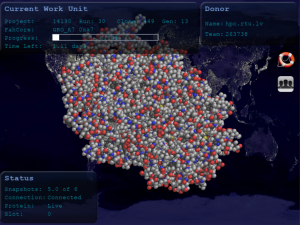RTU Supercomputer in the Fight Against COVID-19
The Latvian scientists are engaged in the research projects initiated by the European Organization for Nuclear Research (CERN) aimed at combating the global COVID-19 pandemic. Researchers of Riga Technical University (RTU) working at CERN participate in the development of lung ventilators and face masks. In their turn, CERN Baltic Group partner institutions – RTU and the University of Latvia, as well as other partners, will offer their supercomputers – computing resources, to provide scientists in Latvia and worldwide an opportunity to make calculations in their research of COVID-19 and in their search for medications against the spread of the virus leading to its eventual eradication.
CERN quickly responded to COVID-19 outbreak by encouraging its research community – approximately 18,000 people worldwide – to fight against the pandemic. These are the researchers who either work at CERN, or in CERN member states, or in CERN partner states. Latvia is not a CERN member state yet, but it submitted an application and at the moment it has a candidate status of an associated member state, and the Latvian scientists are already involved in CERN anti-virus activities.
In the framework of the activity Folding@Home, scientific institutions worldwide and individual scientists have an opportunity to offer their high-capacity computing resources to let scientists all over the world use them in their search for medications, which cure COVID-19. RTU High Performance Computing (HPC) Center, which has a powerful computing infrastructure or, in simplified terms, a supercomputer at its disposal and which offers support to digital technology use in research on a daily basis not only to RTU, but also to the researchers at other institutions, also takes its first steps within the mentioned activity by offering its computing capacity.
RTU HPC Center is engaged in Folding@Home as a part of CERN Baltic Group. Exactly now this group uniting the leading universities and research institutions in the Baltics, which cooperate with CERN, join forces to offer their supercomputers for combating COVID-19. The infrastructure for this activity has been established earlier. Using the funds allocated by the Ministry of Education and Science, Latvia will start the pilot project “Establishment of the Federation CERN Data Center Tier2”, uniting high-performance computing resources of many academic institutions for cooperation with CERN. RTU and the University of Latvia cooperate within the project, the technical coordination of the work is provided by the company “Dati Group”. They have been supported in this research “war” against COVID-19 by other institutions, for example, the National Library of Latvia, which also has powerful computing equipment at its disposal, and universities from Estonia and Lithuania – members of CERN Baltic Group. The activity Folding@Home also invited other players that can offer their computing power to global researchers. Currently, the joint undertaking CERN Baltic Group is at a very early stage of its development, but the primary goal has been achieved – the partners have acknowledged their commitment to engage in the initiative and now are looking for the best ways to implement it.
Toms Torims points out, “What is most important, it is the motivation of our people to do something significant together with the brightest minds of the world. It is a great honour for us, both as Riga Technical University and as a member of CERN Baltic Group, to participate in this project and to coordinate the Baltic contribution to the research work on combating the coronavirus.”
The first tests within COVID-19 research at RTU HPC Center have been already carried out – RTU supercomputers have been used by the Latvian Biomedical Research and Study Centre in the research of COVID-19 genome for analysis of its sequences and determination of four mutations, which the virus has been subjected to in Latvia, as well as by the Bioinformatics Research Unit of Riga Stradins University.



